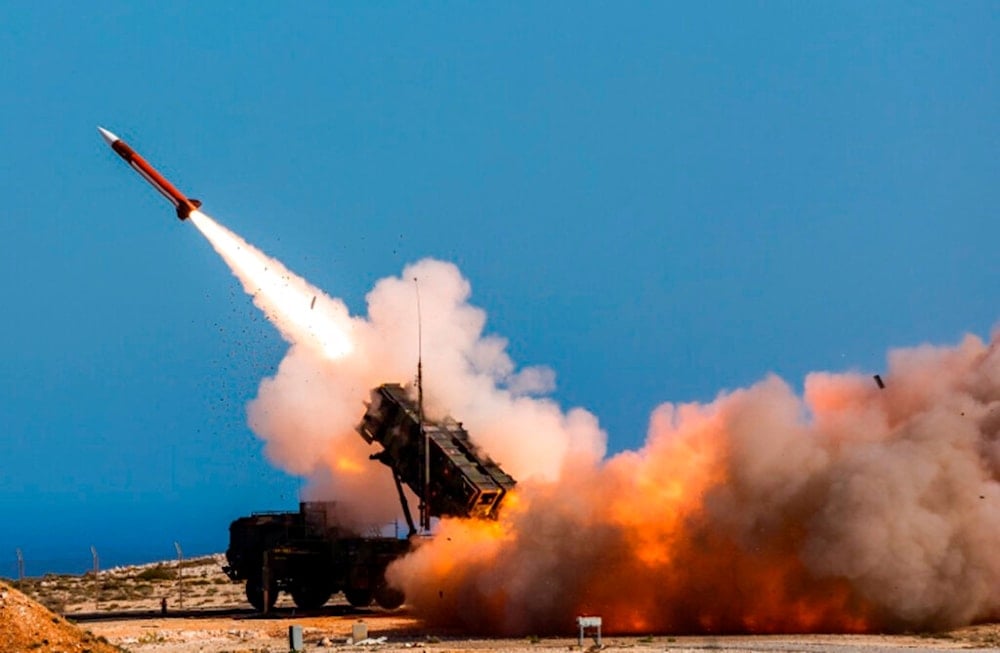Anti-'Israel' sentiment jeopardizes Europe's Iron Dome-style system
The German-led European Sky Shield Initiative faces delays as rising anti-"Israel" sentiment over the war on Gaza threatens cooperation.
-

German soldiers assigned to Surface Air and Missile Defense Wing 1, fire the Patriot weapons system at the NATO Missile Firing Installation, in Chania, Greece, on Nov. 8, 2017 (AP)
Europe's plans to construct an Iron Dome-style missile and drone shield are encountering a significant obstacle as mounting anti-Israeli sentiment, fueled by the war on Gaza, threatens to scupper the initiative.
The German-led Sky Shield Initiative, which aims to create an air-defense dome stretching from Turkey to Finland as part of a massive Continental rearmament drive, is designed to face down any Russian attacks. While its foundation will use the German-made Iris-T and US Patriot surface-to-air batteries for high-altitude interceptions, the system's collaborators are planning to use the Israeli Arrow 3.
Capable of exo-atmospheric interceptions, the Arrow 3 is a joint programme between "Israel" and the US and is the world’s first air-defense system dedicated to shooting down hypersonic missiles.
The Arrow 3's use in the plans for the Sky Shield is being called into question because Europe and "Israel" are at loggerheads over the latter's refusal to end the war in Gaza.
European nations, including Germany, have stopped exporting weapons to "Israel", while Ursula von der Leyen, the president of the European Commission, called on EU members to halt some trade over the war, amid a snowballing push toward recognizing Palestine as a state.
In response to these developments, "Israel" could scupper Europe’s plans for its own Iron Dome, since it holds veto power on exports of its Arrow 3 missile, though such a decision must receive sign-off from its Defence Exports Control Agency (Deca).
In its capacity as the agency responsible for signing off on export licences for domestically produced weapons systems and military equipment, Deca says it does so in “consideration of other national interests.”
David Hening, director at the European Centre for International Political Economy, told The Telegraph that this meant "Israel" could make the political decision to halt its exports of the missiles Europe needs.
Pressure mounts on 'Israel'
In recent months, many of "Israel’s" traditional European allies have grown increasingly critical of the Israeli government.
Using her flagship state of the union address to the European Parliament this week, von der Leyen announced that payments from Brussels to "Israel" would be frozen. Urging deadlocked member states to find a “majority", she called for the suspension of trade elements of an agreement with "Israel" and for sanctions against its “extremist” ministers and settlers.
She urged them to overcome the differences that had previously stopped proposals from suspending funding to "Israel" under the EU’s Horizon research program.
Dozens of capitals are expected to announce similar decisions at the United Nations General Assembly meeting in New York, and European countries are increasingly imposing embargoes on arms exports to "Israel".
Arms embargo on the go
Germany, the Sky Shield’s founding member, said it had “stopped approving war-weapons exports to Israel” last year, and Slovenia, another member of the air-defense scheme, recently became the first EU country to enforce a full arms embargo on "Israel".
Facing urgent calls to bolster European air defenses after Russian drones violated Polish and NATO airspace, prompting the first allied engagement of enemy targets within NATO borders, European Commission President von der Leyen condemned the unprecedented breach during her annual address.
Manfred Weber, leader of the influential European People’s Party, stated that it "simply makes sense" for Europeans to jointly develop a missile defense shield spanning from Finland to Greece, accompanied by an independent sky surveillance system to collect data on potential attacks without relying on Washington.
Without the Arrow 3, the envisaged Sky Shield system would fail to deliver its intended protective effect for the continent. The system would rely on the German-made Iris-T for interceptions within an envelope of up to 40km, while the ground-based mobile Skyranger, produced by Germany’s Rheinmetall, would be deployed to cover smaller spaces against incoming drones.

 4 Min Read
4 Min Read










